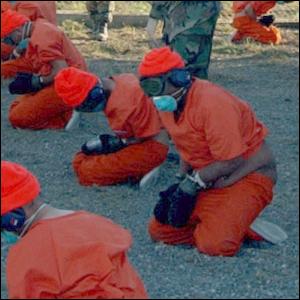A Right Without a Remedy.....
I'm not sure why everyone is reporting that the "compromise" between Bush and the rebel GOP Senators on the interrogation and questioning of detainees is win/win. Seems to me like the Senators completely caved on the Geneva Conventions. Bush wanted to redefine what was prohibited, and from my reading of the compromise, it does just that; it narrowly defines the conduct that would lead to a breach of the Geneva Conventions. I'm not sure where they got these definitions, but it does seem to give the CIA a lot of leeway to go ahead with some of the more controversial techniques.
Not only does it limit the definition of "grave breaches," it also gives the president the exclusive right to promulgate any additional rules regarding the Geneva Conventions that are not grave breaches (i.e., higher standards). So unless Congress changes this law, only the president can extend the offenses punishable as breaches of the Geneva Conventions. Yeah, I'm sure he'll get right on that.
It also states that
"[n]o person may invoke the Geneva Conventions or any protocols thereto in any habeas or civil action or proceeding."
So basically, and correct me if I'm wrong here, the only way the Geneva Conventions can be enforced is if the Attorney General decides to bring criminal charges. Detainees cannot affirmatively use the Geneva Conventions. It does seem that this renders the Geneva Conventions meaningless if the administration du jour decides not to press charges. How does that old adage go? A right without a remedy is no right at all.
It goes on to state that
"[n]o foreign or international sources of law shall supply a basis for a rule of decision in the courts of the United States in interpreting the prohibitions enumerated in subsection 2441(d).
I think this means that courts cannot cite to international or foreign decisions for their rulings. This seems extreme given that foreign and int'l decisions could provide guidance as to how to apply the conventions to specific factual situations (assuming any of this is actually enforced). Why limit ourselves to our own scarce jurisprudence on the subject when other jurisdictions have been interpreting the conventions for years? This self-inflicted myopia is appalling.
I'm going to stop here because my blog has been way too serious of late. Much better analyses than I could ever have done can be found over at national security advisor and balkanization.



No comments:
Post a Comment